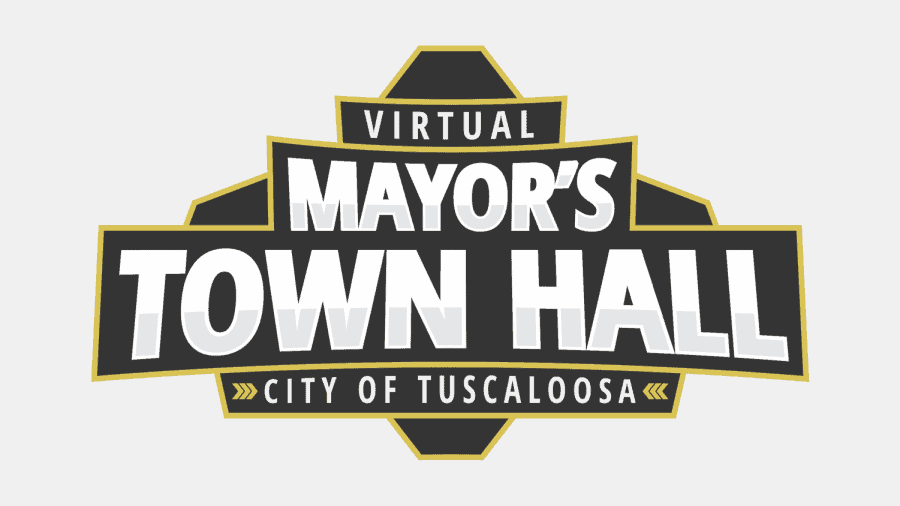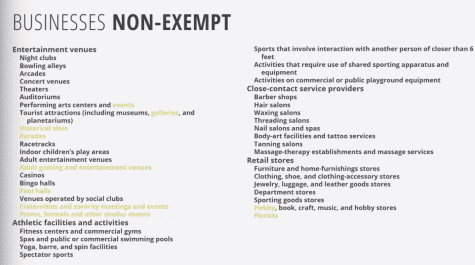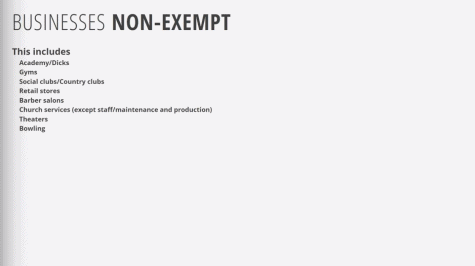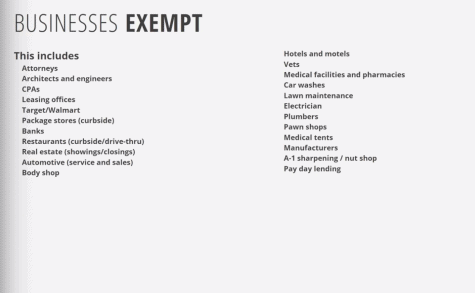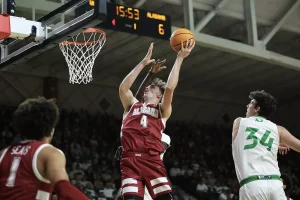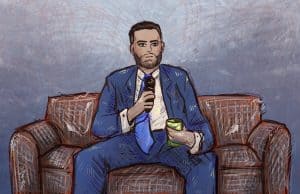‘This is as serious as it gets’: Maddox, leaders answer the city’s most pressing COVID-19 questions
March 27, 2020
Mayor Walt Maddox sat down with City Attorney Glenda Webb and Brendan Moore, executive director of urban development and project lead for Elevate Tuscaloosa, to answer residents’ most pressing questions about coronavirus and its effects on the City of Tuscaloosa. The mayor hosted a virtual town hall on Friday at 3 p.m. via Facebook Live and Periscope.
The trio responded to concerns from a pool of submitted questions and answered them live. The Crimson White has those questions and a summary of the city leaders’ answers.
To re-watch the virtual town hall, viewers can visit Facebook here or Twitter here.
QUESTION: What happened in the span of 36 hours to make us go from a nighttime curfew to a 24-hour curfew?
SHORT ANSWER: Maddox got the green light from Montgomery.
LONG ANSWER: Maddox asked this question himself to kick off the live stream. His answer was simple: COVID-19 cases in Tuscaloosa are rising, and cities got the green light to take matters into their own hands.
“The attorney general [Steve Marshall] issued late Wednesday night an order which affirmed cities’ abilities to take more stringent actions, along with [affirming that] we had concurrence with the Alabama Department of Public Health (ADPH),” Maddox said. “In addition to that, the governor [Kay Ivey] did not want to have any objections to cities taking that action.”
After a briefing from UAB and DCH, Maddox is heeding the data coming from ADPH itself. He is maintaining a “traffic light” analogy, indicating that the City of Tuscaloosa is at a “yellow light” level of operation. He assured that this curfew and insistent social distancing will move the city back to a green light point of view.
“I can also tell you this with great certainty: There’s going to be many unknowns over the weeks and months ahead,” Maddox said. “There’s going to be many times where we’re going to have to be reactive and proactive. But I have no doubt that we are going to rise to this moment.”
QUESTION: Does the new executive order apply to the city and the county, or just the city?
SHORT ANSWER: Just the city.
LONG ANSWER: This morning, State Health Officer Scott Harris issued a statewide health order that puts into place a majority of what Tuscaloosa has already put into place, in terms of curfews and business closures. In most cases, the governor’s order is going to supersede any city orders.
While the statewide order is in place for all of Alabama, Maddox’s 24-hour order applies only to those who live and work in Tuscaloosa city limits, as well as those who fall within Tuscaloosa Police Department’s jurisdiction.
“The executive order of the mayor is through his powers that were granted because of the Disaster and Emergency Declaration that the council enacted, as well as the resolution of emergency powers that was adopted as well,” Webb said.
There are actions coming up that will link city leaders to small business owners so those vendors can find answers regarding where they stand in this order and how they can receive assistance.
“We are working with the Chamber of Commerce to distribute information,” Moore said. “We have three or four dedicated team members who will be available within the next couple of weeks to answer questions and concerns and make sure people have accurate information.”
Moore encouraged small business owners to reach out on 311 or email him directly at [email protected] for guidance in the meantime. Webb also encouraged visiting www.tuscaloosa.com/covid19 for other updates, information and resources.
QUESTION: You have previously stated that the city did not have the authority to implement a shelter-in-place order. What legally changed to make this possible?
SHORT ANSWER: The attorney general’s order.
LONG ANSWER: AG Marshall recognized what was going on in this state, according to Webb, and acknowledging that city leaders know more about their residents than higher-up government officials in Montgomery led to his order to extend the necessary powers to mayors to make their own decisions.
“I know the Alabama Department of Public Health looked at that attorney general’s order and encouraged consultation with the Department of Public Health in regards to any actions that a municipality may take,” she said. “In fact, in the AG’s opinion, it did state that you should seek the concurrence of your county health officer or the state health officer.”
Maddox’s actions were done with the concurrence of the state public health officer. He thanked Ivey, Marshall and Lt. Governor Will Ainsworth for allowing smaller city leaders to do what they believe is best for the communities they serve.
QUESTION: What will be the determining factor in deciding whether or not we move to the red light and shut down the city?
SHORT ANSWER: DCH’s capacity.
LONG ANSWER: Maddox said this decision is based solely on whether the people of Tuscaloosa can flatten the COVID-19 curve efficiently and effectively. He provided an analogy that Tuscaloosans know all too well: Alabama football.
“On game day, we put 100,000 people into Bryant-Denny Stadium, basically in three hours, and we’re able to do that for the most part,” he said. “You can get in, go get something to drink, get to your seat, watch the game, then leave. But if we tried to accomplish that in one hour, we wouldn’t be able to do it.”
Such is the same with health care in Tuscaloosa. Maddox does not want the city’s health systems to become so overwhelmed that they cannot meet the needs of its people. It would take about 5% of Tuscaloosa to get infected with COVID-19 to completely run out of beds at DCH Regional Medical Center, which is the driving fear for these measures.
“We know the infection is going to happen – that’s just a matter of time,” Maddox said. “The more we’re able to slow it down and build it over a curve, the better our health care system is going to be able to help it. That red line comes if we believe the numbers we are seeing are going to lead to the eventual: our hospital being overfilled with patients.”
Maddox is working with DCH to closely monitor these numbers and warned against taking the numbers ADPH publishes as gospel. He said he believes the virus’ impact could be much larger than what has been reported due to its symptomatic tendencies and a lack of complete testing.
“This is what makes the coronavirus so unique,” he said. “The ability for it to spread while being asymptomatic is unlike anything we’ve ever seen. On the conference call with Dr. [Jeanne] Marrazzo yesterday, it was very clear that in Birmingham’s case, the community spread was going on with people who were asymptomatic. I have a fear that that could be the case in Tuscaloosa.”
He said he will be prepared to go to that red light at any moment. Webb said a red light position will probably be preceded by another executive order or ordinance, and it could be accompanied by stricter business closures and redefining who is essential during that level of lockdown.
Moore encouraged e-commerce and touchless options for small businesses, should they need to move forward under that hypothetical order. But, the trio affirmed that businesses should be considering these options anyways to help flatten the curve.
QUESTION: How will this affect our local economy?
SHORT ANSWER: It’s not going to be easy, and short-term effects look detrimental. But there’s hope.
LONG ANSWER: Obviously, the city cannot print money, and discussions about how to address its overall financial picture are underway. But, this virus has a hefty price tag on it: Maddox estimates a $500,000-$700,000 weekly loss to the city because of COVID-19.
“It’s a damn shame that we’re having to make decisions between lives and livelihoods, but that’s where we are, and I think we’re all sick about it,” Maddox said.
Life is operating, to Maddox, in phases. High levels of unemployment and struggling businesses make up the first phase. The next phase will be defined by the state of Tuscaloosa and how it can benefit from President Donald Trump’s $2 trillion stimulus package, which was passed by the House yesterday and the Senate today.
“We are both working on here, at the local level, a short-term and long-term plan to help address any business issues,” Moore said. “State and federal partners, and obviously the city, hopefully will be rolling out a package very soon to assist small businesses as soon as we can get that in front of the city council and obviously, in front of the mayor.”
Maddox projects that curbing the virus’ reach by late May or early June can pave the way for an achievable recovery, but the road will be rough for many small businesses and families along the way. Moore echoed this by reminding business owners to endure short-term pain and seek refuge from the Chamber of Commerce and government agencies to alleviate some of that hurt.
This coming Tuesday, the mayor will have a meeting with city leaders to evaluate what the next six months might look like. More information on that is forthcoming.
“After the next six months, I do believe that the fundamentals of this economy are strong and we can begin recovery,” Maddox said. “Between our very strong reserves, Elevate and the assets … the University may have to take a step back for a year. Mercedes may have to take a step back. These are institutions that are lasting. They’re not going anywhere. And the strong small business sector that we have … it’s not going to be easy, and I will never lie to you. But we’re going to get through this. Continue to make sure you connect with Brandon [Moore] and his team. The Chamber is doing their job, and together, we will be able to work through this.”
QUESTION: Will there be any type of local stimulus package(s) for the small/local businesses who will be suffering from this?
SHORT ANSWER: Yes.
LONG ANSWER: Moore is looking to implement what they are calling a financial “immediate injection” for those who are suffering under COVID-19 restrictions. He’s referring to the restaurants, merchants and other small businesses that have shuttered until the public is able to contribute to the local economy again.
“[We are] potentially looking at a forgivable loan program,” Moore said. “I want to stress that we will not make this bureaucratic; it will be loose on the red tape. A quick application process, quick review process. We’re near finalization in presenting that to Mayor Maddox obviously, then to the city council for approval.”
Webb added that there are some definite legal challenges to doing something like this, but the city is working within those limits to help its businesses. Per the state of Alabama, there are statutory procedures that city leaders must go through to allow them to do a stimulus package or a loan package to help small businesses. But, in conjunction with Moore and his team, a solution should be on its way.
“We’re not designing this in isolation,” Moore said. “We’re designing it with feedback from the small business community, and that includes all sectors.”
QUESTION: Will road construction continue under this order?
SHORT ANSWER: Duh.
LONG ANSWER: While Maddox cannot speak for the projects from the Alabama Department of Transportation, which includes work on Lurleen B. Wallace Boulevard and I-20/59, he confirmed that city-implemented road construction projects will continue to run their course.
“I know it’s been difficult for so many out there, and I don’t like it either when you’re stuck in traffic, but I do believe that having these projects will mean a lot for us when we start the recovery, and that will be important.
Beyond this, the infrastructure that the City of Tuscaloosa is putting into place will provide an even larger payout once the city re-enters its green light status. But in the meantime, Maddox has a message for construction companies still working in Tuscaloosa’s streets: Use the newfound emptiness to get the job done.
“I’m hopeful that the contractors will take this time, since most of them are considered essential, to be able to accelerate the road construction throughout the city,” he said.
Webb added that water and sewer projects will continue as well, as they are essential to the betterment of the city and its residents.
QUESTION: What happens when a person is caught out during lockdown or curfew?
SHORT ANSWER: Persistent offenders will be headed to court – or jail.
LONG ANSWER: Maddox has overwhelming optimism that Tuscaloosans will heed the order he has put in place and just stay home. But for those who want to test it, Webb affirmed that the city has the ability to enforce this curfew to the fullest extent of the law.
A Tuscaloosa police officer will make contact with anyone they see who appears to ignore the ordinance, and generally, they will advise the curfew requirements first. If there is a persistent problem, they will issue a citation. That citation will be accompanied by a court appearance, where offenders can be released with a signature.
“If this becomes an elevated problem, the officers do have the discretion to make an arrest for this offense, and you will be taken to the metro jail for that offense … We’re not looking to impose a police state at this point,” Webb said.
City leaders and Tuscaloosa’s police officers do not want to throw people in jail for being out. Webb reminded viewers that the city is looking for voluntary compliance, with the goal of promoting and protecting overall community health.
She also reminded viewers that there are to be no gatherings above 10 people, and social distancing is highly encouraged at all times, per the state.
QUESTION: I am the plant manager for an automotive supplier here in the industrial park. We supply parts for tractor/trailer assembly plants, which are under the DHS “essential” business category (this has been confirmed by attorneys). What evidence does an employee need to show if stopped within Tuscaloosa?
SHORT ANSWER: It’s up to the cops, but generally an ID will do.
LONG ANSWER: The short answer generally covers it. Webb said this is an officer discretion item during stops, but she suggests keeping an employee badge, ID, paystub or something similar would be good to show and to be prepared to discuss this with the officer.
Moore said that at this time, there are no plans to issue decals or credentials for contractors to help relieve external and internal pressure on the city and businesses. He said documentation may be the direction the city takes to make sure those workers are covered. As for managing and paying bills, there will be some shifts.
“One of the biggest changes is for your water and sewer payments,” Moore said. “The drive-thru will be shut down and the lobby office will be shut down starting on Monday. However, there is a drop box available through the drive-thru lane. You can also pay via mail, online or on auto-draft.”
In addition to this, Moore is communicating with residential and commercial city workers to come up with a way to incorporate video technology to assess issues with residents’ water and sewage at home. More information regarding this will be forthcoming as it is available.
Residents will receive emails, feedback, phone calls or texts for any updates or setbacks. Call 311 for any issues.
QUESTION: I’ve been seeing posts that people are having yard sales this weekend. Should this be banned?
SHORT ANSWER: They’re allowed, but not recommended.
LONG ANSWER: While outside activities are still allowed, Webb wants residents to remember the genesis of the mayor’s order: to protect health. There should still be no groups of more than 10 people. The 6-feet social distance rule should still apply.
“Protect yourselves,” she said. “The only way we can accomplish this together is by working together and realizing that a short-term pain yields a long-term gain.”
QUESTION: Will veterinary clinics be open?
SHORT ANSWER: Yes.
LONG ANSWER: Pet supply stores will also be open.
QUESTION: Do you plan to discontinue trash pickup?
SHORT ANSWER: No.
LONG ANSWER: Garbage, trash and recycling services will keep happening, but the timing may be delayed or inconsistent. Maddox is working with waste management professionals to keep employee numbers limited, but still adequate enough to get the job done. His primary goal is to protect employees while maintaining a clean and healthy city.
Right-of-way crews will continue working, but in a similar limited fashion.
“You can certainly help us by not littering,” Maddox said. “That’s one of the big things you can do to help our community besides social distancing, beside all those other things. Let’s not put our men and women at risk needlessly because we’re so lazy that we have to throw a can out the window.”
Beyond this, bagging lawn clippings or leaves is a small way to leave a big impact on garbage collection. Webb said this will help waste management workers tremendously when trying to complete their routes in an effective and timely manner.
QUESTION: Why do people that live in the city [have] to be shut in while people living in the county can run free?
SHORT ANSWER: Maddox is the mayor of Tuscaloosa, not Tuscaloosa County.
LONG ANSWER: No one is being shut in. But for those who live in the city, Maddox said this is a decision that no one made lightly, and he must do what he can to protect the residents he manages.
“I felt, based off the science and the data, that it was the best decision for Tuscaloosa,” he said. “And we realize that we’re the metro hub not only for the county, but for west Alabama.”
Northport and Tuscaloosa County leaders are working with Tuscloosa and the state constantly, and with the new orders implemented by the state today, the entire county should now be acting in unison under state government actions.
QUESTION: When do you think this will end?
SHORT ANSWER: Maddox is a mayor, not a wizard. He doesn’t have a crystal ball.
LONG ANSWER: In terms of the coronavirus pandemic, Maddox does not see this going away tomorrow. But, he promised he is working with area health systems to monitor numbers and keep the projected timeline as accurate as possible.
“I don’t want to mislead you, but my sense is, based off the data that we see, is that we’re looking probably at a 90- to 120-day event,” Maddox said. “None of us know how the national dynamics impact the state and local dynamics, but that’s my sense, and I think we all need to get in the mindframe that we’ve got a tough three or four months.”
But, he assured, Tuscaloosa’s got this.
“Tuscaloosa does not know how to fail,” Maddox said.
In terms of the curfew, Maddox’s executive order is set to expire April 11, but it is being evaluated daily and could be extended or lifted at any time. Webb noted that the executive order will probably live until April 17, per the state’s guidance.
Exempt and non-exempt businesses
Below is a list of businesses and services that are required to be closed by 5 p.m. Saturday. Larger public parks that encourage gatherings will be closed, but getting outside is not impossible.
Maddox said the Tuscaloosa Riverwalk will still be open but encourages patrons to maintain social distancing and excessive hygiene.
“We tried to balance in this executive order, certainly that if we can practice social distancing, we want people to get outside,” Maddox said. “As someone with a small child, I know how important it is to let that child get out and run and get that energy out – so we’re trying to balance everything, and that’s why we want to go from a yellow light to a green light.”
There are some industries that are exempt from this order. A non-comprehensive list of businesses that are permitted to stay open is below.
More virtual town halls will be scheduled in the future. You can tune in to Facebook Live and Twitter’s Periscope to watch and engage. The Crimson White will work to promote these events as we hear about them.



